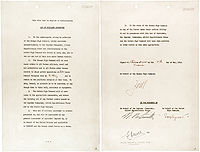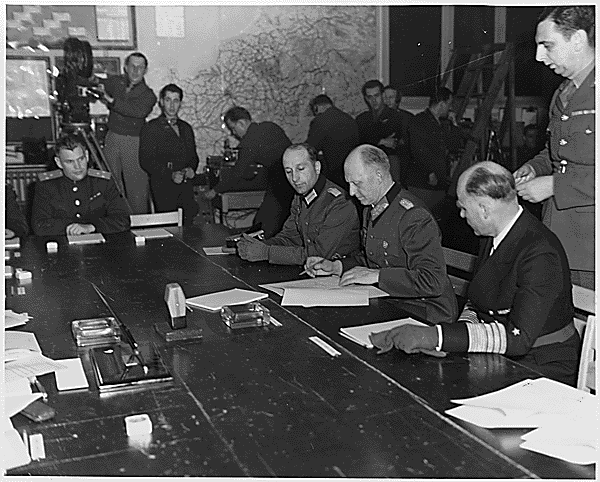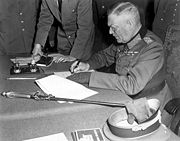
German Instrument of Surrender, 1945
Encyclopedia

Legal instrument
Legal instrument is a legal term of art that is used for any formally executed written document that can be formally attributed to its author, records and formally expresses a legally enforceable act, process, or contractual duty, obligation, or right, and therefore evidences that act, process, or...
that established the armistice
Armistice
An armistice is a situation in a war where the warring parties agree to stop fighting. It is not necessarily the end of a war, but may be just a cessation of hostilities while an attempt is made to negotiate a lasting peace...
ending World War II in Europe. It was signed by representatives of the Oberkommando der Wehrmacht
Oberkommando der Wehrmacht
The Oberkommando der Wehrmacht was part of the command structure of the armed forces of Nazi Germany during World War II.- Genesis :...
(OKW) and the Allied Expeditionary Force together with the Soviet High Command, French representative signing as witness on 7 May, and signed again by representatives of the three armed services
Armed Services
Armed Services is a collective term that refers to the major organisational entities of national armed forces, so named because they service a combat need in a specific combat environment. In most states Armed Services include the Army also known as Land Force or Ground Force, Navy also know a...
of the OKW and the Allied Expeditionary Force together with the Supreme High Command of the Red Army, French and US representatives signing as witnesses (see: Allies of World War II
Allies of World War II
The Allies of World War II were the countries that opposed the Axis powers during the Second World War . Former Axis states contributing to the Allied victory are not considered Allied states...
) on 8 May 1945. The date is known in the West as Victory in Europe Day
Victory in Europe Day
Victory in Europe Day commemorates 8 May 1945 , the date when the World War II Allies formally accepted the unconditional surrender of the armed forces of Nazi Germany and the end of Adolf Hitler's Third Reich. The formal surrender of the occupying German forces in the Channel Islands was not...
, whereas in post-Soviet states the Victory Day is celebrated on 9 May. In Germany, it is known as the Day of Capitulation (Tag der Kapitulation).
There were three language versions of the surrender document. The English and Russian versions were the only authoritative ones.
Background
Preparations of the text of the instrument of surrender began by US, Soviet and British representatives at the European Advisory CommissionEuropean Advisory Commission
The formation of the European Advisory Commission was agreed on at the Moscow Conference on October 30, 1943 between the foreign ministers of the United Kingdom, Anthony Eden, the United States, Cordell Hull, and the Soviet Union, Molotov, and confirmed at the Tehran Conference in November...
(EAC) throughout 1944. By the 3rd of January 1944 the Working Security Committee in the EAC proposed
that the capitulation of Germany should be recorded in a single document of unconditional surrender.
The committee further suggested that the instrument of surrender be signed by representatives of the German High Command. The considerations behind this recommendation were to prevent the repetition of the stab-in-the-back legend, created in Germany following defeat in the First World War, since the act of surrender in November 1918 was signed by representatives of the German government and the militarist circles later claimed that the High Command was not responsible for that defeat.
Not everyone agreed with the Working Security Committee's predictions regarding the war's end. Lord William Strang, 1st Baron Strang
William Strang, 1st Baron Strang
William Strang, 1st Baron Strang, GCMG, KCB, MBE was a British diplomat who served as a leading adviser to the British Government from the 1930s to the 1950s and as Permanent Under-Secretary at the Foreign Office from 1949 to 1953....
, British representative at the EAC, claimed as follows:
It is impossible at present to foresee in what circumstances hostilities with Germany may in the end be suspended. We cannot tell, therefore, what mode of procedure would be most suitable; whether, for example, it will be found best to have a full and detailed armistice; or a shorter armistice conferring general powers; or possibly no armistice at all, but a series of local capitulations by enemy commanders.
The surrender terms for Germany were first discussed at the first EAC meeting on 14th January 1944.
On 14th March 1945 the EAC held a meeting with the representatives of Czechoslovakia, the Netherlands, Belgium, Luxembourg, Norway, Yugoslavia and Greece on the issue of the instrument of surrender. The Czech government proposed the document shall include a paragraph against acquisition of territories by force and would mention the responsibility of the German state to the war. The governments of Belgium, Netherlands and Luxembourg, concerned with their positions as small Allied nations, recommended that the instrument of surrender shall include a specific acknowledgement of the part to be played by the small countries in the control of Germany. The Norwegian government requested the document to include specific reference to the demand of surrender of the German troops in Norway. The Yugoslav government declared its intention to refrain from any specific recommendations until an agreement on unity government was reached between Josip Broz Tito
Josip Broz Tito
Marshal Josip Broz Tito – 4 May 1980) was a Yugoslav revolutionary and statesman. While his presidency has been criticized as authoritarian, Tito was a popular public figure both in Yugoslavia and abroad, viewed as a unifying symbol for the nations of the Yugoslav federation...
and Prime Minister Ivan Šubašić
Ivan Šubašic
Ivan Šubašić was a Croatian and Yugoslav politician, best known as the last Ban of Banovina of Croatia.He was born in Vukova Gorica, then in Austria-Hungary. He finished grammar and high school in Zagreb, and enrolled onto the Faculty of Theology at the University of Zagreb...
. The Greek government requested to include in the document a demand to all German forces that may remain on Greek territory at the moment of surrender to surrender their military equipment to the Greek Royal government.
Surrender in Rheims

The unconditional surrender
Unconditional surrender
Unconditional surrender is a surrender without conditions, in which no guarantees are given to the surrendering party. In modern times unconditional surrenders most often include guarantees provided by international law. Announcing that only unconditional surrender is acceptable puts psychological...
of the German armed forces was signed by Generaloberst
Colonel General
Colonel General is a senior rank of General. North Korea and Russia are two countries which have used the rank extensively throughout their histories...
Alfred Jodl
Alfred Jodl
Alfred Josef Ferdinand Jodl was a German military commander, attaining the position of Chief of the Operations Staff of the Armed Forces High Command during World War II, acting as deputy to Wilhelm Keitel...
, on behalf of the Oberkommando der Wehrmacht
Oberkommando der Wehrmacht
The Oberkommando der Wehrmacht was part of the command structure of the armed forces of Nazi Germany during World War II.- Genesis :...
(German language: High Command of armed forces) and as the representative for the new Reich President
Reichspräsident
The Reichspräsident was the German head of state under the Weimar constitution, which was officially in force from 1919 to 1945. In English he was usually simply referred to as the President of Germany...
, Grand Admiral
Grand Admiral
Grand admiral is a historic naval rank, generally being the highest such rank present in any particular country. Its most notable use was in Germany — the German word is Großadmiral.-France:...
Karl Dönitz
Karl Dönitz
Karl Dönitz was a German naval commander during World War II. He started his career in the German Navy during World War I. In 1918, while he was in command of , the submarine was sunk by British forces and Dönitz was taken prisoner...
. Walter Bedell Smith
Walter Bedell Smith
Walter Bedell "Beetle" Smith was a senior United States Army general who served as General Dwight D. Eisenhower's chief of staff at Allied Forces Headquarters during the Tunisia Campaign and the Allied invasion of Italy...
signed on behalf of the Western Allies, and Ivan Susloparov
Ivan Susloparov
Ivan Alekseyevich Susloparov was a Soviet general who served as the Military Liaison Mission Commander with the French government and the Allied Expeditionary Force in Europe in 1944-45. He is mostly known as the person who signed for the Soviet Union the German Instrument of Surrender on May 7,...
on behalf of the Soviets. French major general François Sevez
François Sevez
François Sevez was a French general during World War II. Sevez was present at the German surrender in Rheims, and signed the German Instrument of Surrender as the official witness.-Military career:...
signed as the official witness.
Surrender in Berlin


The Soviets also argued that the surrender should be arranged as the most important history event and not on the conqueror's territory, but in the place German aggression sprang from: in Berlin. The Soviet side insisted that the act of surrender signed in Rheims should be considered "a preliminary protocol of surrender", so the Allies agreed that another surrender ceremony should take place in Berlin.
A second Act of Military Surrender was signed shortly before midnight on 8 May at the seat of the Soviet Military Administration in Berlin-Karlshorst
Karlshorst
Karlshorst is a locality in the borough of Lichtenberg in Berlin. It houses a harness racing track and the Hochschule für Technik und Wirtschaft Berlin , the largest University of Applied Sciences in Berlin, and the German-Russian Museum Berlin-Karlshorst.-History:Established in 1895 as the...
, now the location of the German-Russian Museum Berlin-Karlshorst
German-Russian Museum Berlin-Karlshorst
The German-Russian Museum Berlin-Karlshorst is dedicated to German-Soviet and German-Russian relations with a focus on the German-Soviet war 1941-1945.- The museum building :...
.
Representatives:
- Soviet UnionSoviet UnionThe Soviet Union , officially the Union of Soviet Socialist Republics , was a constitutionally socialist state that existed in Eurasia between 1922 and 1991....
: MarshalMarshal of the Soviet UnionMarshal of the Soviet Union was the de facto highest military rank of the Soviet Union. ....
Georgy ZhukovGeorgy ZhukovMarshal of the Soviet Union Georgy Konstantinovich Zhukov , was a Russian career officer in the Red Army who, in the course of World War II, played a pivotal role in leading the Red Army through much of Eastern Europe to liberate the Soviet Union and other nations from the Axis Powers' occupation...
on behalf of the Supreme High Command of the Red Army - United Kingdom: Air Chief MarshalAir Chief MarshalAir chief marshal is a senior 4-star air-officer rank which originated in and continues to be used by the Royal Air Force...
Arthur William TedderArthur Tedder, 1st Baron TedderMarshal of the Royal Air Force Arthur William Tedder, 1st Baron Tedder, GCB was a senior British air force commander. During the First World War, he was a pilot and squadron commander in the Royal Flying Corps and he went on to serve as a senior officer in the Royal Air Force during the inter-war...
, as Deputy Supreme Commander of the Allied Expeditionary Force, - United States: General Carl SpaatzCarl SpaatzCarl Andrew "Tooey" Spaatz GBE was an American World War II general and the first Chief of Staff of the United States Air Force. He was of German descent.-Early life:...
, Commanding United States Strategic Air ForcesUnited States Strategic Air ForcesThe US Eighth Air Force in World War II, later designated the United States Strategic and Tactical Air Forces was the first and became the overall command and control authority of the United States Army Air Forces against the European Axis members during World War II, where it'd started as a...
, as witness - France: General Jean de Lattre de TassignyJean de Lattre de TassignyJean Joseph Marie Gabriel de Lattre de Tassigny, GCB, MC was a French military hero of World War II and commander in the First Indochina War.-Early life:...
, Commanding First French Army, as witness - Germany:
- Field Marshal Wilhelm KeitelWilhelm KeitelWilhelm Bodewin Gustav Keitel was a German field marshal . As head of the Oberkommando der Wehrmacht and de facto war minister, he was one of Germany's most senior military leaders during World War II...
as the Chief of Staff of the German Armed Forces and as representative of the army (Oberkommando der Wehrmacht) - Admiral Hans-Georg von FriedeburgHans-Georg von FriedeburgHans-Georg von Friedeburg was the deputy commander of the U-Boat Forces of Nazi Germany and the last Commanding Admiral of the Kriegsmarine....
as Commander-in-Chief of the navy (KriegsmarineKriegsmarineThe Kriegsmarine was the name of the German Navy during the Nazi regime . It superseded the Kaiserliche Marine of World War I and the post-war Reichsmarine. The Kriegsmarine was one of three official branches of the Wehrmacht, the unified armed forces of Nazi Germany.The Kriegsmarine grew rapidly...
) - Colonel-General Hans-Jürgen StumpffHans-Jürgen StumpffHans-Jürgen Stumpff , was a German general of the Luftwaffe during the Second World War.-Early life:Born in Kolberg, Stumpff entered the Brandenburgisches Grenadierregiment Nr. 12 "Prinz Karl von Preußen" as an ensign in 1907. Promoted to lieutenant in 1908, by the start of the First World War,...
as the representative of the air force (LuftwaffeLuftwaffeLuftwaffe is a generic German term for an air force. It is also the official name for two of the four historic German air forces, the Wehrmacht air arm founded in 1935 and disbanded in 1946; and the current Bundeswehr air arm founded in 1956....
)
- Field Marshal Wilhelm Keitel
See also
- End of World War II in EuropeEnd of World War II in EuropeThe final battles of the European Theatre of World War II as well as the German surrender to the Western Allies and the Soviet Union took place in late April and early May 1945.-Timeline of surrenders and deaths:...
- DebellatioDebellatioDebellatio designates the end of a war caused by complete destruction of a hostile state....
- Nuremberg TrialsNuremberg TrialsThe Nuremberg Trials were a series of military tribunals, held by the victorious Allied forces of World War II, most notable for the prosecution of prominent members of the political, military, and economic leadership of the defeated Nazi Germany....
- Morgenthau PlanMorgenthau PlanThe Morgenthau Plan, proposed by United States Secretary of the Treasury Henry Morgenthau, Jr., advocated that the Allied occupation of Germany following World War II include measures to eliminate Germany's ability to wage war.-Overview:...
- Paris Peace Treaties, 1947Paris Peace Treaties, 1947The Paris Peace Conference resulted in the Paris Peace Treaties signed on February 10, 1947. The victorious wartime Allied powers negotiated the details of treaties with Italy, Romania, Hungary, Bulgaria, and Finland .The...
, formally established peace between the World War II Allies and the nations of Bulgaria, Hungary, Italy, Romania, and Finland - Japanese Instrument of SurrenderJapanese Instrument of SurrenderThe Japanese Instrument of Surrender was the written agreement that enabled the Surrender of Japan, marking the end of World War II. It was signed by representatives from the Empire of Japan, the United States of America, the Republic of China, the United Kingdom, the Union of Soviet Socialist...
- Treaty on the Final Settlement with Respect to GermanyTreaty on the Final Settlement with Respect to GermanyThe Treaty on the Final Settlement With Respect to Germany, was negotiated in 1990 between the Federal Republic of Germany and the German Democratic Republic , and the Four Powers which occupied Germany at the end of World War II in Europe: France, the Soviet Union, the United Kingdom, and the...
Further reading
- Kiley, Charles. Details of the Surrender Negotiations: This Is How Germany Gave Up, Stars and StripesStars and Stripes (newspaper)Stars and Stripes is a news source that operates from inside the United States Department of Defense but is editorially separate from it. The First Amendment protection which Stars and Stripes enjoys is safeguarded by Congress to whom an independent ombudsman, who serves the readers' interests,...
. (a contemporary, 1945, US military newspaper account) - Samson, Oliver. The German Capitulation Tangle, Deutsche WelleDeutsche WelleDeutsche Welle or DW, is Germany's international broadcaster. The service is aimed at the overseas market. It broadcasts news and information on shortwave, Internet and satellite radio on 98.7 DZFE in 30 languages . It has a satellite television service , that is available in four languages, and...
8 May 2005 - authour?. The Memoirs of Georgy Zhukov, Chapter 22: Unconditional Surrender of Nazi Germany, publisher ?

